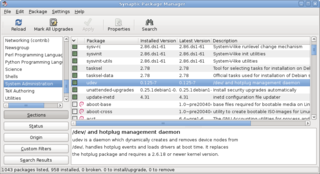
Cygwin is a POSIX-compatible programming and runtime environment that runs natively on Microsoft Windows. Under Cygwin, source code designed for Unix-like operating systems may be compiled with minimal modification and executed.

A package manager or package-management system is a collection of software tools that automates the process of installing, upgrading, configuring, and removing computer programs for a computer in a consistent manner.
GNU Autoconf is a tool for producing configure scripts for building, installing, and packaging software on computer systems where a Bourne shell is available.

The GNU Autotools, also known as the GNU Build System, is a suite of programming tools designed to assist in making source code packages portable to many Unix-like systems.

In computer programming, GNU Libtool is a software development tool, part of the GNU build system, consisting of a shell script created to address the software portability problem when compiling shared libraries from source code. It hides the differences between computing platforms for the commands which compile shared libraries. It provides a commandline interface that is identical across platforms and it executes the platform's native commands.
In software development, Make is a build automation tool that automatically builds executable programs and libraries from source code by reading files called Makefiles which specify how to derive the target program. Though integrated development environments and language-specific compiler features can also be used to manage a build process, Make remains widely used, especially in Unix and Unix-like operating systems.

In software development, GNU Automake is a programming tool to automate parts of the compilation process. It eases usual compilation problems. For example, it points to needed dependencies.

Portage is a package management system originally created for and used by Gentoo Linux and also by Chrome OS, Calculate, Sabayon, and Funtoo Linux among others. Portage is based on the concept of ports collections. Gentoo is sometimes referred to as a meta-distribution due to the extreme flexibility of Portage, which makes it operating-system-independent. The Gentoo/Alt project is concerned with using Portage to manage other operating systems, such as BSDs, macOS and Solaris. The most notable of these implementations is the Gentoo/FreeBSD project.
MinGW, formerly mingw32, is a free and open source software development environment to create Microsoft Windows applications.

Apache Ant is a software tool for automating software build processes which originated from the Apache Tomcat project in early 2000 as a replacement for the Make build tool of Unix. It is similar to Make, but is implemented using the Java language and requires the Java platform. Unlike Make, which uses the Makefile format, Ant uses XML to describe the code build process and its dependencies.

SCons is a computer software build tool that automatically analyzes source code file dependencies and operating system adaptation requirements from a software project description and generates final binary executables for installation on the target operating system platform. Its function is analogous to the traditional GNU build system based on the make utility and the autoconf tools.

make menuconfig is one of five similar tools that can configure Linux source, a necessary early step needed to compile the source code. make menuconfig, with a menu-driven user interface, allows the user to choose the features of Linux that will be compiled. It is normally invoked using the command make menuconfig; menuconfig is a target in Linux Makefile.
pkg-config is a computer program that defines and supports a unified interface for querying installed libraries for the purpose of compiling software that depends on them. It allows programmers and installation scripts to work without explicit knowledge of detailed library path information. pkg-config was originally designed for Linux, but it is now also available for BSD, Microsoft Windows, macOS, and Solaris.
In computing, a shebang is the character sequence consisting of the characters number sign and exclamation mark at the beginning of a script. It is also called sharp-exclamation, sha-bang, hashbang, pound-bang, or hash-pling.

In software development, CMake is cross-platform free and open-source software for build automation, testing, packaging and installation of software by using a compiler-independent method. CMake is not a build system but rather it generates another system's build files. It supports directory hierarchies and applications that depend on multiple libraries. It is used in conjunction with native build environments such as Make, Qt Creator, Ninja, Android Studio, Apple's Xcode, and Microsoft Visual Studio. It has minimal dependencies, requiring only a C++ compiler on its own build system.
The FreeBSD Ports collection is a package management system for the FreeBSD operating system, providing an easy and consistent way of installing software packages. As of February 2020, there are over 38,487 ports available in the collection. It has also been adopted by NetBSD as the basis of its pkgsrc system.
The following outline is provided as an overview of and topical guide to the Perl programming language:

Meson is a software tool for automating the building (compiling) of software. The overall goal for Meson is to promote programmer productivity. Meson is free and open-source software written in Python, under the Apache License 2.0.










